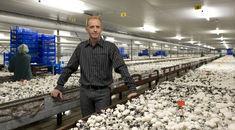
Approximately half of Prime Champ’s weekly production of 500 tonnes of white closed cups and buttons, as well as a substantial proportion of chestnuts, are on sale in both major UK supermarkets and the foodservice industry, and plans are in place to increase the firm’s presence on the major retail markets.
The Dutch company has already reached capacity with its current bed area and has recognised that, in order to fulfil future export potential, it must expand its facilities and also its portfolio. Some of the new beds will, for the first time, be devoted to portobellos and flats.
Sustained growth during the past 15 years has helped bring the Netherlands back as a serious contender to the UK market, where imports are needed to fill gaps in supply that have widened because of difficulties in Ireland, as well as the shortfall that happens at times in supplies from new EU members such as Poland.
Marc Kerkhofs, financial director, says the secret behind the resurgence is that the Dutch industry is far more streamlined having gone through a period of consolidation. At one point, there were more than 600 small producers in the area, growing on small bed areas. These sheds and garages that were often part of the house have all but disappeared.
“One reason, as in other horticultural industries, is that the multiple trade requires consistent, large volumes,” he says. “Growers had to invest, combine their efforts or simply go out of business because they did not have the infrastructure to handle these programmes.
“It was not just a case of providing volume. It was necessary to have a flexible approach to meet orders that could vary over the year due to seasonal demand, and at the same time combine this with full traceability. In other words Prime Champ is very much market-driven instead of production-driven.”
These elements have proved to be the key to the emergence of Prime Champ on the mushroom scene as a £40 million market leader, as it widens it’s market, based on 30 years’ experience.
“We have succeeded because we run a total vertically integrated operation,” explains Verdellen. “We control our composting on four different sites supplying our five separate growing sites, which represent over 80,000 sqm. In turn, these are linked to headquarters, which is responsible for quality control, packaging, logistics and sales.”
At a cost of more than €750,000 (£600,00), Prime Champ installed a Navision system, a standard ERP application by Microsoft widely used in many industries, but also enhanced it to conform with the requirements of mushroom growing with modular and customised add-ons.
“This means that we can offer customers full traceability right back to the picker and the actual bed,” explains Theo Haegens, a mushroom consultant whose company, Insight, has wide experience, including work in the US. His wife, Yvonne Linssen, is responsible for marketing and innovation at Prime Champ.
Mushrooms are simply not just mushrooms for this company, and although it can be an over-used expression, there is every justification to describe the job as a passion for Prime Champ. It is probably unique in the entire international industry, as it runs a specialised mushroom restaurant next to its production facility at Horst.
With a seating capacity of 100, the restaurant is open to the public from Monday to Friday, between 10am and 5pm, and on the first Sunday in every month. Regarded in the Netherlands as a gourmet experience, De Paddestoeleji Restaurant offers a substantial menu from which an enthusiast can order mushrooms for every course from starters to dessert - and they could not be fresher, as the product literally grows on the other side of the restaurant wall.
“It’s not just an eating experience, but combines practical public relations as it shows consumers the versatility of the crop and its value as a low-calorie health food,” says Linssen.
The facility also contains six meeting rooms, a novel setting for company conferences, while the facility even provides training courses for would-be chefs.
Customers can also see a presentation of the vast scale of the operation. This covers the continuous process of compost making, explores the mysteries of mushroom spawning - which Verdellen jokes is “still steeped in magic and fairy dust,” - and as a prelude to the three-week production cycle, automatic tray filling.
However, mushrooms, as any grower will confirm, are not easy to grow. The vast casing trays stacked eight high in the dark once they are in the growing sheds, must have the right balance of heat and moisture to get the crop to burst into life.
Despite the control, there can be sudden surges in the mushroom job, which is why its farms operate seven days a week. It is also labour intensive. While harvesting buttons for the processing industry is automated, the fresh crop is too delicate. “There have been several attempts to provide robot picking, the most recent being the trials at the University of Warwick, but it is still a long way off,” says Haegens.
Meanwhile, it is commercial reality, however, which drives the wheels. This is an appropriate metaphor, as at a time when food miles and carbon footprints are beginning to dominate both retail and consumer thinking, the Netherlands is well placed.
With complete control of both the production and distribution chain, Prime Champ does not regard the North Sea as a barrier to trade with the UK. Watching some of its fleet of 18, 10-tonne lorries depart for the UK - to arrive in less than seven hours - Verdellen makes the point that “the Netherlands is closer to the UK than its main import competitor, Ireland”.
We know that everyone is looking to reduce cost while the emphasis remains on quality and service, “ says Verdellen. “This is what has been our yardstick ever since we began.”



